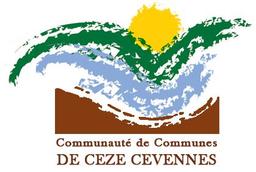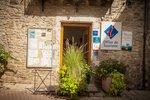
Les dolmens de l’Ismaël
3 points of interest

Courry - © S.M.  History
HistoryCourry
It is difficult to tell the history of Courry at the time of the Camisard War, the archives having been destroyed in a fire in 1973. However, oral tradition includes an anecdote that made Courry famous in the late 18th century. Abbot Murjas brought back from Italy an infallible recipe for an omelette that cured rabies. Once the omelette had gained a reputation for efficacy, people came from very far away to eat it. It was extremely salty, and its secret was the three herbs it contained. But the remedy was only effective on one condition: to drink nothing for the three following days! This was very hard in Courry, where the weather is so hot that people say that “even snakes die of thirst”!
Table d'orientation à la chapelle Saint-Sébastien - © JF.Raulet  History
HistorySt Sebastian’s Chapel
There is still a yearly pilgrimage to St-Sebastian’s Chapel, up the slope with its southern summer scents. The pilgrims do not come to ring the bells – which is reputed to make rain fall on this thirsty stony land – but to worship and bless the children.
The village escaped a powerful wave of the plague in 1720, which ravaged surrounding valleys. In 1722 the chapel was built on this promontory to thank God for His protection. Each year, the second Monday of September was dedicated to the pilgrimage. It has since been moved forward to the last Monday in August so as to take place during the school holidays.
Genévrier oxycèdre - ©Nathalie Thomas  Flora
FloraCade (prickly juniper)
Juniper is a typical garrigue (arid shrubland) species which was used for centuries to produce oil by distilling its heartwood. Cade oil can treat dermatoses, kill parasites, heal sheep’s wounds and keep away flies. The cade oil producer would arrive in an area suggested by its owner and there build his own drystone hut (a capitelle) and oven. This oven demanded substantial know-how. Made of firebricks mortared with beaten clay, it had a vase shape about 1 ½ m high and was open at the top so that juniper branches could be thrown in. The distilled wood could be removed through a door at the bottom. The oil ran out from under the door. About 50 cm from this vase, the oilmaker would build a drystone wall, the circular space inside it being the hearth. The whole construction would then be covered in soil to make it airtight: a molehill with a diameter of 6 m!
Description
Starting at "COURRY", follow "PIERRE MORTE" via "Croix de Parens", "La Courpatière", "Les Cayrades", "L’Aulanet", "Les Rivières", "Les Thomases" and "Le Pouchanne". Then head for "CHAPELLE ST-SÉBASTIEN" and "Plateau St-Sébastien". Go back down towards "COURRY" via "La Tourre", "Les Plannes" and "Les Chênes" to reach "DOLMENS DE L’ISMAËL". Continue to "Les Mijoulets", "Les Usclades", from where you can do a short return trip to the educational dolmen, then take "Chemin de la Transhumance" and return to "COURRY" via "Croix de Parens".
This hike is taken from the guidebook Cévennes Haute Vallée de la Cèze, published by the Communauté de communes Cèze Cévennes as part of the collection Espaces Naturels Gardois and the label Gard Pleine Nature.
- Departure : Courry
- Arrival : Courry
- Towns crossed : Courry, Gagnières, and Saint-Paul-le-Jeune
Forecast
Altimetric profile
Recommandations
Information desks
Tourism office CezeCévennes, Bessèges
14 rue de la République, 30160 Bessèges
This office is part of the National Park's associated tourist-information network, whose mission is to provide information on, and raise awareness of, the sites and events as well as the rules that must be observed in the National Park's central zone.
Open year-round
Tourism office Cèze-Cévennes Saint-Ambroix
Place de l'ancien Temple, 30500 Saint-Ambroix
This office is part of the National Park's associated tourist-information network, whose mission is to provide information on, and raise awareness of, the sites and events as well as the rules that must be observed in the National Park's central zone.
Open year-round
Transport
liO is the regional public transport service of the Occitanie/ Pyrénées – Méditerranée region. It facilitates everyone’s movements by prioritising public transport. For more information, call 08 10 33 42 73 or go to www.laregion.fr
Access and parking
Parking :
Calculateur d'itinéraire Lio
Utilisez le calculateur liO pour organiser votre trajet en région Occitanie.
Autres régions
Calculez votre itinéraire en Auvergne Rhône Alpes sur Oùra
Biodiversité autour de l'itinéraire
Source


Report a problem or an error
If you have found an error on this page or if you have noticed any problems during your hike, please report them to us here:


